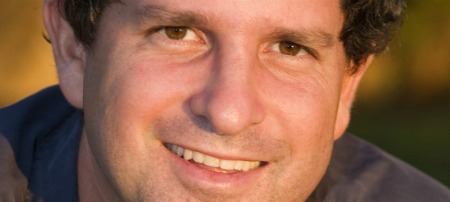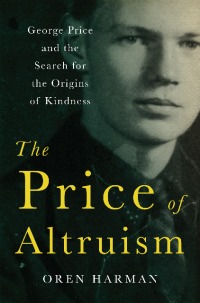Oren Harman talks to ISRAEL21c about his award-winning biography on a real-life Forrest Gump.

“And the winner is … Oren Harman, for The Price of Altruism: George Price and the Search for the Origins of Kindness.”
To Israeli professor Oren Harman, that announcement at the April 29 Los Angeles Times book awards was an unexpected Oscar-style moment. His biography of an ultimately self-destructive do-gooder also received a Pulitzer Prize nomination and was named a New York Times Notable Book of the Year for 2010.
It’s conceivable that he’ll one day hear the same announcement at the Academy Awards, since his acclaimed biography is being talked up in Hollywood.
“The story is very film-like, and it’s been suggested as a movie,” Harman tells ISRAEL21c. “Sometimes these things take time and a little sprinkle of luck.”
Price is described by his biographer as “a real-life Forrest Gump.” The US-born Price formulated an evolutionary mathematical equation proving that altruism is actually self-interest in disguise. This realization so disturbed Price that he tried to transcend it by giving his all — literally — to the destitute of London.
“This radical altruism killed him, because he gave away everything, became homeless and committed suicide,” relates Harman. “When he was buried [in a North London cemetery in 1975], there were 10 people there, six of them homeless.”

Even before the LA Times prize, The Price of Altruism garnered spectacular reviews and a lot of correspondence. A few readers want to donate toward a tombstone for Price. In September, Harman may join them and Price’s daughters to place the marker.
‘I wanted to return home’
Now chairman of the graduate program in science, technology and society at Israel’s Bar-Ilan University, Harman — like Price — has roots in the United States and England.
Born in Jerusalem in 1973, Harman is the grandson of British transplant Abe Harman, who served as Israel’s ambassador to Washington between 1960 and 1969 and later as president of the Hebrew University. His father, a professor of education, met his New York-born mother while they were students at Harvard.
Harman briefly taught at Harvard after earning degrees in history and biology from Hebrew and Oxford universities. In 2002, he returned to Israel to do a post-doctorate in genetics, history and the philosophy of science at Hebrew University.
“It was clear to me I wanted to return home,” he relates. “I love Israel, and my family and friends are here. But beyond that, it’s better for my research that I can do it somewhat removed from the eye of the storm.”
He was not expecting to go into academia. “I thought of becoming a singer, doctor or educator. Academia was last on my list,” he says, due to what he perceives as its traditionally “stifling disciplines.”
“These disciplinary divides are unnatural in my mind. I teach that these rules are unnecessary and you can do important work in science or history without them. I have a lot of respect for serious scholarship, but academia needs to reach out to the world.”
His reluctance was overcome by winning a prestigious Allon Fellowship, which is intended to enable universities to absorb outstanding young researchers.
Touching our conundrums
At Bar-Ilan, Harman teaches evolutionary theory, the interplay between scientific, social and philosophical thought — and writing.
“Writing is a big deal for me,” he says. “Teaching how to write is in many ways teaching how to think.”
Harman previously wrote The Man Who Invented the Chromosome (Harvard, 2004) and Rebels, Mavericks and Heretics in Biology (Yale, 2008). His essays have appeared in many prominent periodicals, most frequently The New Republic, and he co-created Did Herzl Really Say That? an Israeli Oscar-nominated documentary series.
Next up are books about non-biologists who solved fundamental biological mysteries (“starting with Goethe, who had an important role in morphology, and Chomsky, who is a linguist but had an impact on the study of brain architecture”) and another using evolutionary theory to delve into “scientific myths” about concepts such as beauty and motherhood.
“Each age talks about its myths with the language at its disposal. Today, our language is scientific, but in a sense we’re no better off than the cavemen or the Greeks, in that we can only try to touch our deep existential conundrums but not solve them.”
Despite his packed schedule, Harman claims to be “a very relaxed kind of guy” who loves a good night’s sleep and eats from plates and bowls fashioned on his potter’s wheel. “The clay on your fingers is very sensual and beautiful,” he says.
Harman is a bachelor whose closest group of friends was formed during his years in a special reconnaissance unit of the Israel Defense Forces.
“On a small, elite team, you have a human mirror around you 24 hours a day, and you have to look at yourself, warts and all, and deal with it,” he says. “You have to face up to your deficiencies and vulnerabilities and become a better person. This experience connected me strongly to the country, because we walked it, and to [fellow soldiers] from many different backgrounds. We are still like brothers.”
He says he felt proud to “sort of represent Israel” at the LA Times award ceremony, but stresses that his nationality “is not part and parcel of my work. My themes are not Israeli.”
When The Price of Altruism came out, publisher W.W. Norton suggested taking it on the Jewish book circuit.
“I was not crazy about that idea, since the topic is not Jewish,” says Harman. “I wanted to win my stripes on the merit of the work and be more universal. The fact that I’m Israeli is a big part of who I am. Art should transcend these peculiarities, though. True universal art and writing should speak to everyone.”













